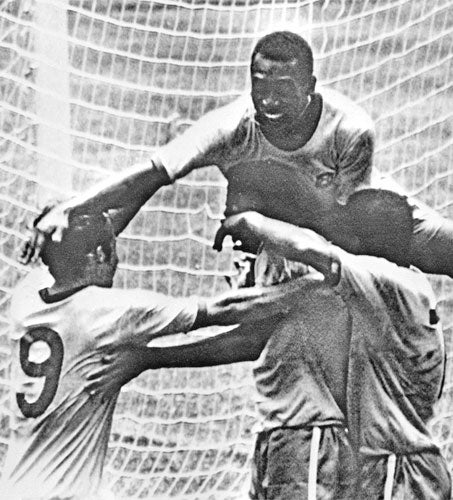The greatest side ever assembled that won the greatest World Cup approached the tournament in a state of utter chaos. The man who was to manage Brazil in 1970 was Joao Saldanha, who was a television commentator. Not even the FA has ever thought of employing John Motson to give orders from the dug-out, and this was a Motty who got through three packs of cigarettes a day, believed in revolutionary Marxism and wanted to drop Pele.
Seven months before their opening game, he discarded most of Brazil's back four and both their goalkeepers. In March, in Porto Alegre, they lost, unforgivably, to Argentina, who had not even qualified for the tournament.
Suddenly the slogans of "Nothing Can Stop This Nation Now" and a training programme based on the one Nasa had designed for its astronauts seemed an embarrassment. There were few advantages of the fascist dictatorship that ran Brazil in 1970 but after the defeat by Argentina, they at least felt able to fire their manager. The rather more amenable Mario Zagallo was appointed and, having reassured Pele of his place in the team, he used the remaining warm-up games to switch Rivelino from inside left to a left winger. The rest is glittering history.
There have been few pre-World Cup friendlies as decisive as Brazil v Argentina. More often they confuse matters. Germany's leading newspaper, Bild, had little time for Jürgen Klinsmann, based in California and full of the sporting psychobabble of the Golden State.
When they were humiliated 4-1 by Italy in Florence and then outplayed by Japan in their final friendly, Bild suggested that Germany should withdraw from its own tournament to spare itself embarrassment. By July, Klinsmann was acclaimed a hero by the Brandenburg Gate. Which is the real Argentina of Diego Maradona; the one crushed 6-1 by Bolivia in qualification or the one that dominated the Germans in a friendly in Munich?
When they swept aside Egypt in March, Sir Alex Ferguson remarked that, for the first time, it was possible to imagine Fabio Capello's team winning the World Cup. Two months later, after incoherent performances against Mexico and Japan, England seem more uncertain, on their third captain of the year, with the re-emergence of Joe Cole as the only positive.
However, Capello might recall that Bobby Robson's side were booed off the pitch after defeat in their final friendly at Wembley – against Uruguay – before departing for Italy. However, in his preparations for Italia '90, Robson stuck largely to the same side; the only player to break through was the young Paul Gascoigne. It was only once his World Cups – in both Mexico and Italy – began, that Robson made or was persuaded by his players to make sweeping and effective changes.
Gascoigne was the single most famous victim of an England pre-tournament friendly. When Glenn Hoddle, whose belief in reincarnation and faith healing was at least as bizarre as Saldanha's in politics, saw Gascoigne, his head bandaged, struggling in Casablanca, he decided to act immediately. And so the England manager called him into his hotel room and watched Gascoigne wreck the furniture as the wallpaper music of Kenny G floated around the suite.
To someone such as Andy Cole, who was also dropped, this was a dreadful, impulsive blunder. Cole, commenting in these pages, suggested that when Hoddle's back was pressed most firmly against the wall in St-Etienne, down to 10 men and facing Argentina, Gascoigne might have been a trump card to pull from the bench. But he was elsewhere, probably with a bottle and cigarette.
Subscribe to Independent Premium to bookmark this article
Want to bookmark your favourite articles and stories to read or reference later? Start your Independent Premium subscription today.


Join our commenting forum
Join thought-provoking conversations, follow other Independent readers and see their replies